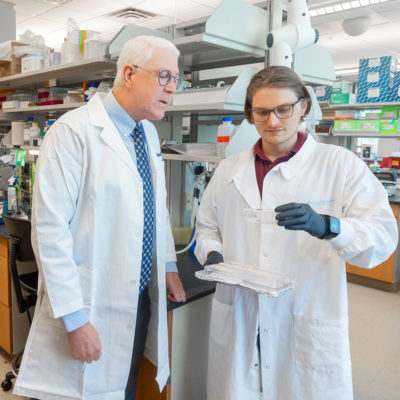On October 25, 97 participants joined us by Zoom for our Appetite for Life seminar on Nutrition and Cancer. NRI Director, Stephen Hursting, PhD, MPH and Evan Paules, PhD, a postdoctoral research fellow in Hursting’s lab, presented their research on triple-negative breast cancer (TNBC) and the impact nutrition can make on cancer diagnosis and treatment. You can read about the research here.
NRI’s Appetite for Life events are great opportunities to ask our scientists about their research. At the end of every presentation, we open the floor for questions. Below are a few of the Q&As from this most recent event:
Q: Why do you think breast cancer percentages are so high in NC? Could it be that more women are having mammograms and thus it’s being identified? Or is it diet?
A: One reason may be our tobacco rates tend to be a bit higher than other places. We have many hotspots that are being studied by the UNC Lineberger Cancer Center. Our colleagues assessing this have found a strong correlation to diet. Obesity rates in North Carolina are on the higher side as well. As stated in the seminar, there are also trends across categories of race and ethnicity. For instance, there seems to be a particularly high increase in breast cancer in American Indians in the last few years and the research shows a strong correlation to obesity rates. Fortunately, these major drivers are controllable and can be reversed.
Q: Is adipose tissue (fat) distribution associated with the risk of cancers?
A: Yes. The most concerning adipose type is what we call visceral white adipose tissue. It tends to have an association with inflammation, and it can impact metabolism in negative ways, so it is certainly something we measure and pay attention to. In our research with weight loss drugs, we were concerned that one of the side effects of these drugs would be a significant loss of lean body mass but, thus far, that does not seem to be the case. The bulk of weight loss with these drugs is indeed adipose tissue, particularly visceral white adipose tissue. It appears that this targeting is contributing to some of the anti-cancer effects of these drugs.
Q: Is there still a risk of breast cancer with hormone replacement therapies?
A: Yes, there is. Hormone replacement therapies are carefully considered in the case of cancer treatment.
Q: Do you support the use of continuous glucose monitors (for any interested person) as a tool for identifying those unique dietary factors that are increasing inflammation in the body?
A: Glucose monitors are getting better and better. They are tremendous tools for assessing glycemic control. They’re not going to tell you anything about inflammation, but there are other ways to assess that information.
Q: More recently, I am hearing that daily physical activity should occur throughout the day. Are there still benefits to exercising during an isolated period, e.g., walking at 6 p.m. every evening?
A: There is interesting literature about this. Should you spread out the activity throughout the course of the day? Should you exercise more in the evening? Or should it be in the morning? Well, I really hate to disappoint everyone, but it appears that research is pointing to trying to get your exercise done at the very beginning of the day. It will be most beneficial then for maintaining a healthy weight. That doesn’t necessarily exclude trying to get a bit of physical activity throughout your day. For example, if you have a desk job, it’s good to get up from your desk and walk around – try to get those 10,000 steps in every day. Even just standing up and stretching can do a lot.
Q: Is there anything else you can share about your triple negative cancer research?
A: I think the most promising and interesting is the work in the immunotherapy space. We are asking how diet and obesity influence the effectiveness of these therapies. We are also investigating if these weight-loss drugs or our dietary approaches impact triple negative breast cancer risk through an immune modulatory effect. We’re also doing a major project on the metastatic side of the story. In triple negative breast cancer, tumors will often spread from the primary tumor to three major sites of the body : liver, lung and brain. The question here is, what is the underlying effect of diet and particularly obesity? Obesity seems to be really pro-metastatic, so we’ve been studying that. We have a couple of grants with friends and colleagues at Purdue University who are helping us uncover some of the metabolic explanations of that.
You can watch the entire seminar, including the full question-and-answer portion here. Join us for our next Appetite for Life on December 5. Learn more about the series here.

